Meet the 2022 Khoury College award winners
Author: Madelaine Millar
Date: 11.14.22
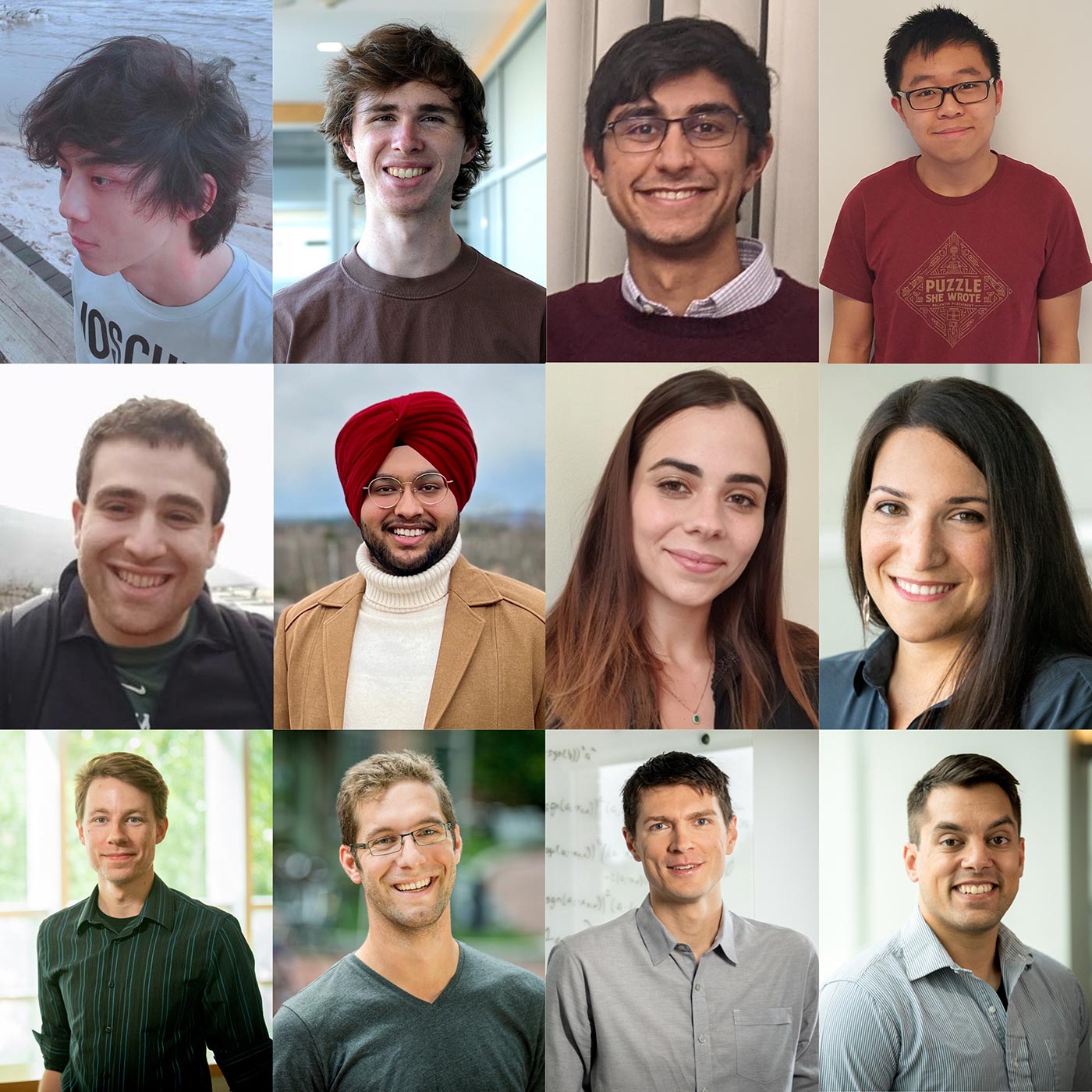
Every day, Khoury College community members excel in their classrooms, research labs, co-op positions, community service, and beyond. And every year, a few truly stretch the boundaries of creativity, innovation, service, and learning. Read on to meet the 12 outstanding students, faculty, and alumni who were honored for their accomplishments in 2022, or click a name to jump to that point on the page.
- Undergradute: Xuyang Li (research), Ryan Drew (community service), Rahul Toppur (teaching), Kevin Hui (outstanding co-op)
- Graduate: Ian Dardik (research), Rajwinder Singh (community service), Clara Bezerra (teaching)
- PhD: Lydia Zakynthinou (research), Alexi Turcotte (community service), Ben Nye (teaching)
- Teaching: Paul Hand (Ruth and Joel Spira Outstanding Teacher Award), Mike Shah (Best Teacher Award)
Undergraduate Research Award: Xuyang Li
In the spring of 2020, Xuyang Li was grappling with a terrifying new disease. Just not the one you’d expect.
The same week his Khoury classes went remote, Li was diagnosed with mid-stage cutaneous T-cell lymphoma, a rare skin cancer that causes painful rashes and skin tumors and, if left untreated, can be deadly.
“It gave me really strong motivation to work because as a patient, I feel the distress of not knowing what’s going on with me. We don’t understand the disease as well as we would love to,” Li said.
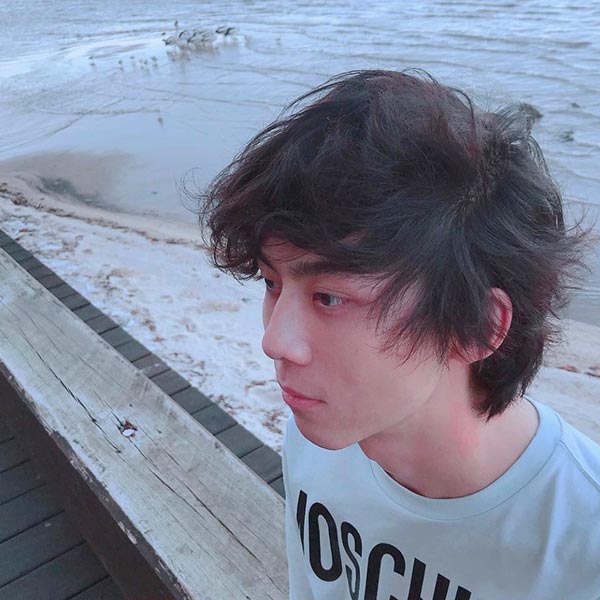
So instead of postponing their education to focus on health, Li added a combined data science and biochemistry major (and a physics minor) to their existing mathematics major, thus positioning themself to bring CS tools to the study of rare diseases.
Two and a half years later and in stable condition, Li has produced prolific research. They have worked with biologists at Harvard Medical School and the Department of Veterans Affairs on classifying and profiling rare immune cell subtypes for Alzheimer’s disease and machine learning algorithms for early detection of dementia. They’ve also worked with the Takeda pharmaceutical company on oncology translational genomics, published a paper on semantic hierarchy trees for algorithms, and conducted counterfactual analysis of pharmacogenetic testing for breast cancer.
“We’re always interested as biologists to know what the biomolecular network in the human body is in its normal state and abnormal states,” Li said. “What happens with the transcriptome (mRNA) when you are in a disease state? Once we know that, it’s more feasible for us to design a method to treat it.”
Li graduated from Northeastern in May and is now pursuing a PhD in biomedical engineering at Johns Hopkins University. Their goal is to create accessible computational tools that allow biologists without CS training to better use available data — vital for rare diseases like cutaneous T-cell lymphoma where data is harder to generate and find.
Undergraduate Community Service Award: Ryan Drew
When speaking with a co-founder of one of Khoury College’s most impactful software engineering collectives — responsible for the widely-used Khoury Office Hours app, SearchNEU, and the portfolios of countless first-time co-op applicants — one might expect to find someone excited to talk their accomplishments up. But Ryan Drew expresses only deep gratitude — towards Sandbox’s student programmers, its clients, and especially his co-founders Da-Jin Chu and Arun Jeevanantham.
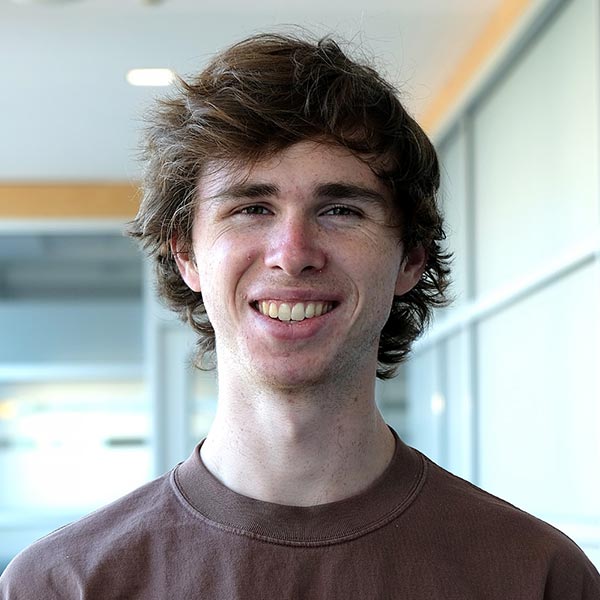
Sandbox originated in 2018 with just those three; the next semester, they brought together a dozen students to build apps that assisted psychology professors with their research. Since then, software engineering experience, meaningful volunteer projects, and the club’s ethos of kindness and learning together have grown Sandbox’s membership to nearly 60.
“The more people we talked to about it, the more we realized that a club that unites programmers who want to work on fun stuff together is a good thing,” Drew said. “None of us are really obsessed with elitism or clout or anything like that — that would be a detriment to the community environment.”
Drew graduated with a degree in computer science in December 2021 and now works as a software engineer at Meta. He is excited to see Sandbox not just sustaining itself but thriving in his absence, and he hopes other students will find the same talented peers and lifelong friends that he did.
“I would not be the software engineer I am today if not for the people I met at Northeastern. The school is good, the co-op program is good, but the peers I had at Northeastern taught me more than any of the classes,” Drew said. “I got lucky, and I want other people to get lucky too.”
Undergraduate Teaching Award: Rahul Toppur
What first drew Rahul Toppur to instruction was the desire to further his own education.
“After I took my set of introductory classes — interacting with the office, the teaching assistant staff, and the course — I felt this was a great way to learn more about the material,” he said. “As you’re going through the classes yourself, you keep a list of things you struggle with, almost like a quick help guide. Anyone else who encounters the same problems, you can help them out really quickly.”
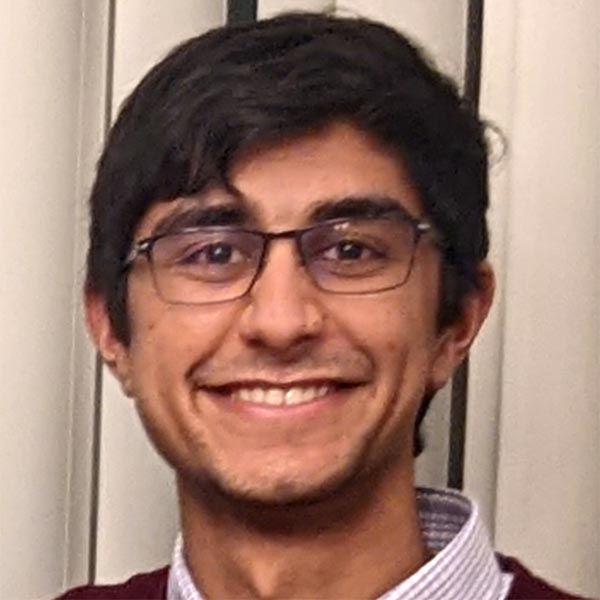
But as he got more involved — tutoring calculus; serving as a TA for “System Security,” “Foundations of Cybersecurity,” and “Foundations of Software Engineering” — Toppur discovered a deep fulfillment from helping other students the same way TAs had helped him.
“Teaching online, you’ll have these big threads where you’re giving the students a hint, they’ll try something, and you give them another nudge,” Toppur said. “Sometimes they’ll be pretty epic; you’ll have 30 different posts, and then towards the end you’ll see ‘Oh, we finally got it, thanks so much — I really appreciate you leading me the right way.’”
Toppur graduated in May with a systems-focused CS degree and is now working in threat vulnerability management at his old co-op employer Salesforce. If he decides to pursue grad school, Toppur says he would seek teaching opportunities again, as being a TA has fundamentally changed how he thinks about school.
“When I picked up exam printouts as a TA,” Toppur said, “I was like whoa, this is just a piece of paper. I don’t know why I was freaking out about this.”
Undergraduate Outstanding Co-op Award: Kevin Hui
Networking, programming languages, or security? E-commerce company, social media giant, or nonprofit? DevOps, automation projects, or consumer products? Regardless of the question, Kevin Hui’s answer is always the same: jump into uncomfortable, unfamiliar territory headfirst, because that’s where he’ll learn the most.
In his time at Khoury College, Hui did three co-ops — at the financial software company Intuit, the ecommerce browser extension Honey, and the company formerly known as Facebook — as well as internships at the MITRE Corporation, Microsoft (twice!), and Amazon.
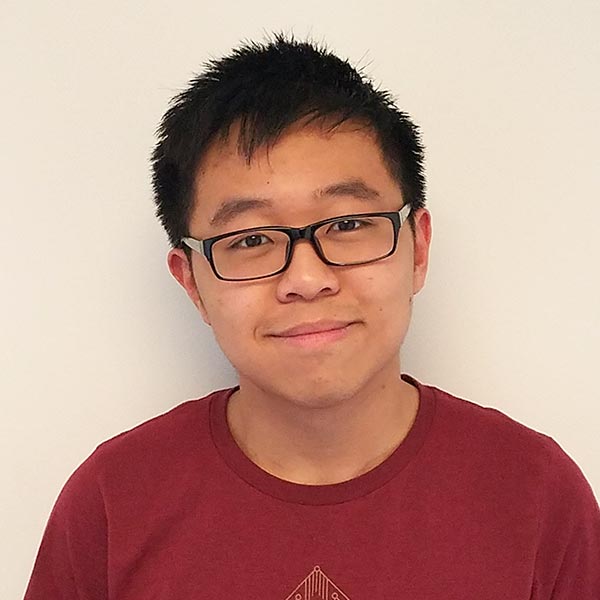
READ: Northeastern team wins third straight MITRE capture the flag competition
“The biggest thing that the co-ops taught me was what I wanted to get out of my full-time job, and what I really didn’t want to do,” Hui said. “I’ve learned that I really enjoy optimizing systems, writing close to the metal … This kind of systems work teaches me so much about the computer itself, and how this weird hunk of metal can do bizarre things.”
After graduating in December 2021 with a degree in CS and a minor in mathematics, Hui returned to Meta to work in network security. After plenty of experimentation, he discovered that what excited him most was the constant feedback loop of building something, discovering its flaws, seeing those flaws abused by nefarious actors, and then building protections that push the envelope of security even further. His advice for students eyeing companies like Meta, Amazon, or Microsoft is to think deeply about what their goals are and why, then commit to them hard.
“It’s about persistence and learning,” Hui said. “Understanding what your exact goals are and whether or not you really want them is a great way to learn more about yourself. You can say you want to go to Google, but if that’s just because you don’t have any other goal in mind, then it’s hard to stick true to that.”
Graduate Research Award: Ian Dardik
When he joined Khoury College after six years as a software engineer, Ian Dardik had a clear goal: dive deep into research. Exactly how, he wasn’t sure — until he was nominated for a Khoury Research Apprenticeship, which matches master’s students with research mentors and faculty advisors. It also provides additional support, such as workshops on how to read research papers or apply to PhD programs.
“I couldn’t have asked for anything better as far as getting me into research,” Dardik said. “The professors I know at Khoury are great; they’re willing to lend you a hand and offer you advice.”
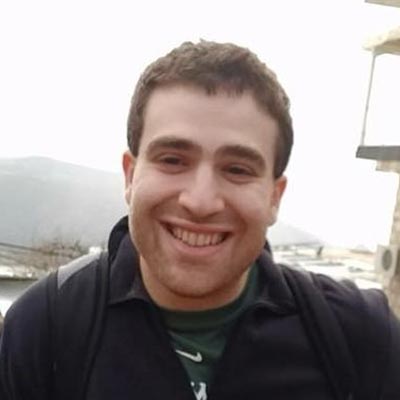
Under associate professor Stavros Tripakis, Dardik was introduced to inductive invariants, precise mathematical statements of all the possible states of a given algorithm. Inductive invariants make it feasible for researchers, using a mathematical proof, to guarantee that computers in a distributed system agree on something. For instance, if a person makes an online banking transaction, researchers can use inductive invariants to guarantee that all the bank’s servers agree that the transaction was made, and that the money would be in your account whether you checked from your phone or from a computer at the bank. Dardik’s work focuses largely on verifying distributed systems and discovering inductive invariants automatically.
“After some time in the apprenticeship, I got to the point where I tried to discover an inductive invariant for part of the algorithm myself. I basically worked nonstop, 14-hour days for a week,” Dardik said. “I eventually figured it out; it was a big triumph. I felt great, like I actually did something useful, even though it wasn’t the full algorithm.”
After graduating in December with an MS in CS, Dardik joined the Carnegie Mellon Software and Societal Systems Department as a PhD student. He wants to stay in the world of formal methods — the wider, mathematical-theorem-based research area that includes inductive invariants — but he’s excited to explore new subfields, such as the intersection of formal methods and machine learning.
Graduate Community Service Award: Rajwinder Singh
Rajwinder Singh arrived at Khoury College from Chandigarh, India in the spring of 2020, just in time for the pandemic to send all his classes remote. As he attended classes and club meetings from his apartment, and without local friends to fall back on, his first semester was isolated, even lonely. So Singh decided to be the change he wanted to see.
Singh joined the Khoury Master’s Student Council (KMSC), which liaises between the college and its master’s students, but also organizes activities like panel discussions and game nights to support students’ academic and career advancements, enhance professional and personal development, and cultivate community.
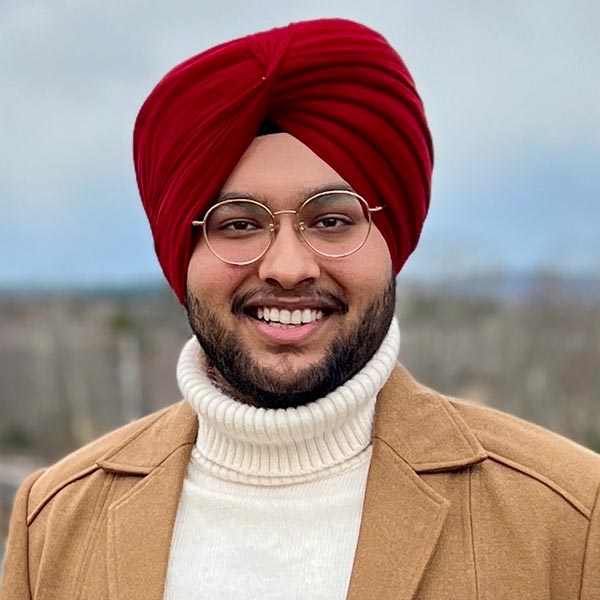
He quickly ascended to the role of president, working to build a stronger network of graduate students across all Khoury College campuses. In Singh’s final semester as president, KMSC was nominated for the Student Organization of the Year Award at the Student Life Awards, and Singh was nominated for Student Leader of the Year.
“People would reach out to me, they’d meet me in class and say, ‘Oh hey, I met you at the KMSC event; I saw you at that event.’ That felt very enriching, to actually make friends across campus,” Singh said. Other students have told him the council has helped them build connections too. “I always enjoyed the discussions of new ideas for events, and working with my team towards their execution gave me the satisfaction of giving back to the community.”
After he graduated with a degree in CS and a concentration in AI, Singh accepted a full-time position as a systems engineer at Qualcomm, which he had interned with during his graduate studies. He credits his position, in part, to the confidence and direction he developed as the KMSC president.
“These extracurricular activities gave me the opportunities to work on my leadership and interpersonal communication skills,” Singh said, “and by the time I graduated, I had some idea of what I wanted to do.”
Graduate Teaching Award: Clara Bezerra
Clara Bezerra didn’t always know that she wanted to teach computer science; for a long time, she didn’t even know that she wanted to study it. Before joining Khoury College’s Align program — a CS master’s for students without academic backgrounds in CS — Bezerra studied international relations and Spanish, and jumping to a computer science course of study was as challenging as it was exciting.
“I can totally relate to students coming to me in office hours and saying, ‘I’ll be honest, I have no idea what is going on,’” Bezerra said.
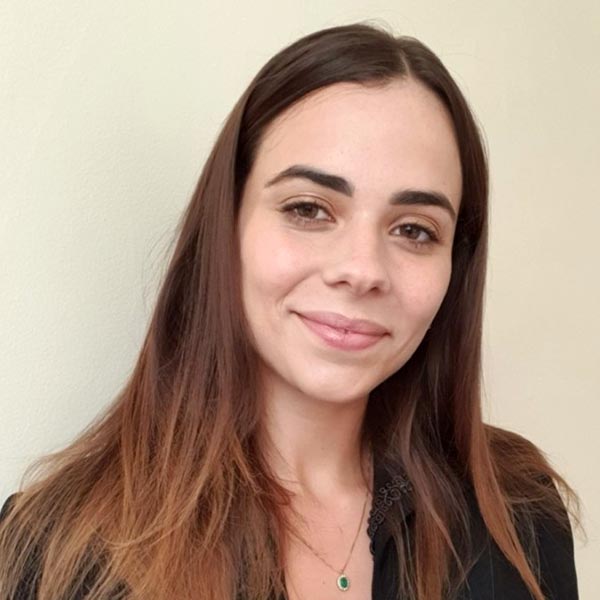
“I tried to remind my students that everyone feels underwater. I was in the exact same pool as them, and I still feel overwhelmed with information. Everyone feels the same way, and it’s still possible to succeed.’”
Bezerra worked as a TA for the Align course “Intro to Computer Science” and then for “Object Oriented Design” the following semester, which meant she got to see many of the same students learn and grow throughout a full year.
“The amount that they learned is just so, so incredible, and I think a lot of the time they don’t even realize that. When the course started many of them were writing their first-ever lines of code, and just six months later they were able to write an entire application from the ground up,” Bezerra said. “They might feel like they’re lagging because the course is so fast, but they’re succeeding and I’m so proud of them for not giving up.”
After her experiences as a TA, Bezerra wants to be a professor, but before that she wants to spend more time in industry. She intends to use her degrees in CS, international relations, and Spanish to build tech that contributes to Latin American immigration rights, such as an app to connect immigrants with one another or with lawyers.
PhD Research Award: Lydia Zakynthinou
Lydia Zakynthinou knows who you are. Well, not literally. But she can find out very easily from supposedly anonymized machine learning training data, and she thinks that’s a problem.
“Most everything we use, we don’t pay for, and what we exchange is our private, potentially sensitive information,” Zakynthinou said. “It is unreasonable to impose on each individual the full weight of protecting their own data, so it’s important for the people who collect and analyze data to do it in a way that protects the user.”
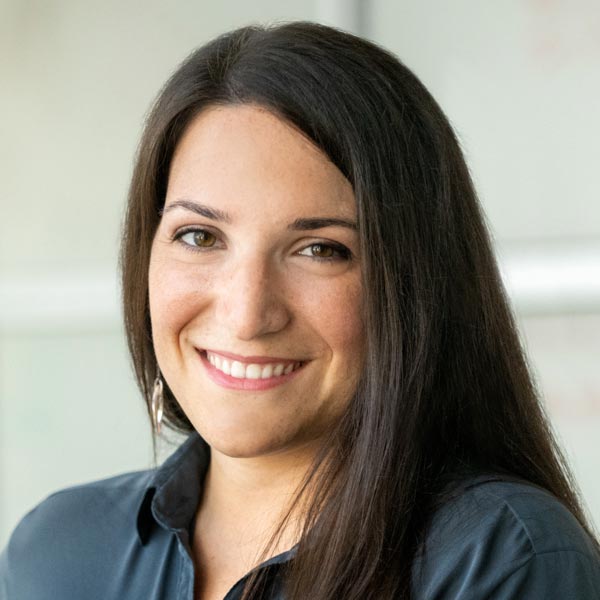
READ: Lydia Zakynthinou wins coveted Facebook Fellowship
Zakynthinou researches differential privacy, the idea that a person viewing the output of analyzed data shouldn’t be able to tell whose data was used as the input. Differentially private algorithms are objectively better and more reliable because they better satisfy another condition called generalization — performing in the real world the same way they do on their training data. Zakynthinou’s research built on this idea, introducing an optimized, unifying notion about generalization in machine learning algorithms. Her work captures conditions such as differential privacy and other notions of algorithmic stability.
“I feel like anything that unifies two notions hints to a more general truth, and that’s the exciting thing about theoretical computer science: trying to figure out general truths,” Zakynthinou said.
Zakynthinou is in the sixth and final year of her PhD program studying theoretical foundations of machine learning and data privacy. She plans to pursue a postdoctoral research position and explore the interdisciplinary implications of her research.
PhD Community Service Award: Alexi Turcotte
What ultimately made Alexi Turcotte choose Khoury College for his PhD wasn’t the rigorous academics or the accomplished faculty; it was the clever, friendly, and open Northeastern students he had met at conferences and summer schools. Focusing on his potential peers made sense to Turcotte, who has always put people at the center of his academic life.
“There’s this prevailing theme in the research community where research is everything — you have to be obsessed with your research, and so passionate that you want to do it all the time,” Turcotte said.
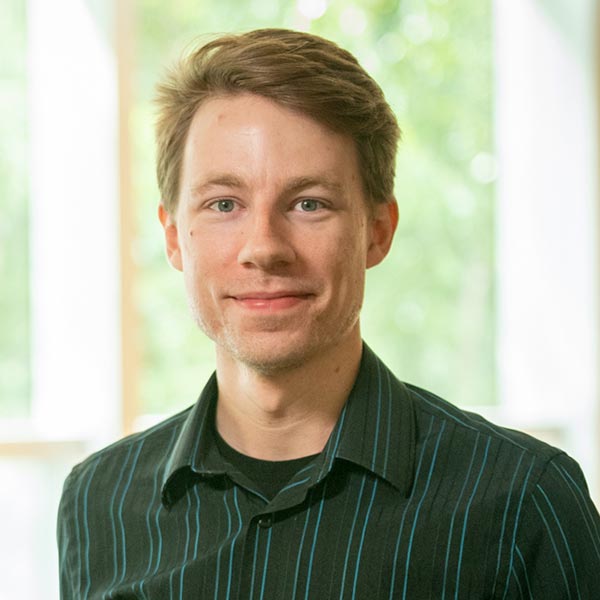
“But there’s more to life than research — there are humans involved in science. It’s really fun working with people, getting to know them, teaching them, mentoring them, being mentored by them, learning from them.”
In his time at Northeastern, Turcotte has sat on Khoury College’s curriculum, PhD admissions, and faculty hiring committees, aiming to ensure student voices and interests are considered in large administrative decisions. He has pushed for a more flexible PhD curriculum with fewer broad courses and more room for students to specialize quickly, and for a greater prioritization of the professor–graduate student worker relationship in faculty hiring decisions.
“It’s cool coming here and being frustrated with some things and then with a couple years of effort those things are fixed,” Turcotte said. “I get the sense that the university does care, the college does care what the students think.”
Turcotte has one year left in his PhD on programming languages and software engineering. After graduating, he plans to pursue a postdoctoral research position to further explore his research interests for a few years before seeking a faculty position and developing as a mentor.
PhD Teaching Award: Ben Nye
Ben Nye’s desire to teach at a college level was a major motivator for him to pursue a graduate degree in the first place. He fell in love with computer science the first time he took a CS class, and he loved the idea of sharing that experience with other students.
“One of the coolest things about teaching is getting to know your students, forming a relationship and watching them grow and evolve in the way they think about content and how it fits into the world,” Nye said. “Computation is everywhere; it’s a cool mechanism for understanding the world around us.”
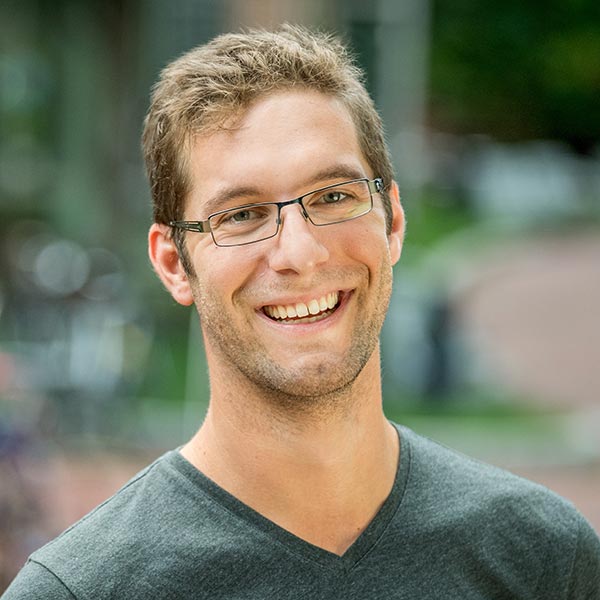
Nye has always been interested in interdisciplinary work too. His favorite class to teach is natural language processing, for the unique way it blends regimented math with messier, more organic language. On the flip side, insights from his research — on using NLP to efficiently extract meaning from text, for instance for doctors who need to read masses of trial reports quickly — flow smoothly back into his work in education.
“There’s this really interesting question: how do we represent knowledge? What is an efficient vehicle for conveying information, and how does the language we use represent knowledge in different ways?” Nye said. “We have two very different machines: the human brain and the silicone. Do they process information in the same way? And if they don’t, are these differences telling us anything interesting about the science of learning?”
After earning a PhD in CS with a specialty in natural language processing, Nye is now teaching computer science at Colorado College. He is excited by the opportunity to build a radically interdisciplinary computer science curriculum there.
The Ruth and Joel Spira Outstanding Teacher Award: Paul Hand
To Paul Hand, a computer science education isn’t just about building skills or landing a better job. He teaches CS because he believes that a solid foundation in computational thinking is essential to understand and interact with the modern world as a responsible citizen.
“It’s important to know how to think about algorithms, even if you never develop one, because so much of our lives is controlled by algorithms,” Hand said. “The main challenge with learning algorithms is truly accepting the idea that computers are dumb. They do exactly what you told them to do — no more, no less.”
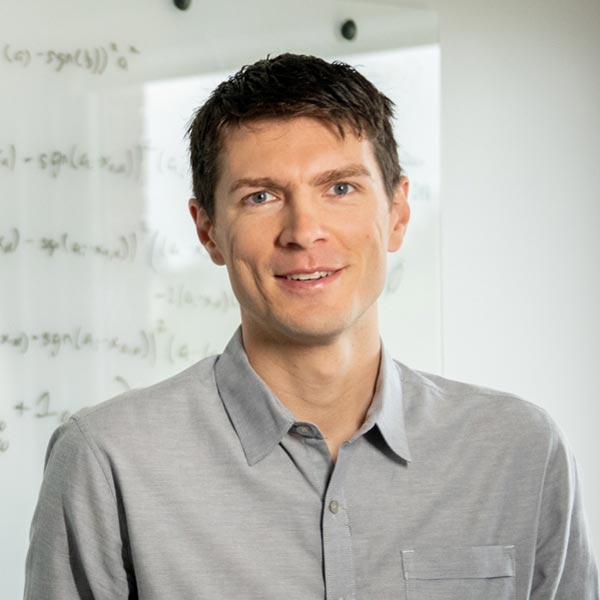
Hand holds a joint appointment between the College of Science, where he teaches applied mathematics, probability, and statistics, and Khoury College, where he teaches algorithms, machine learning, and AI. As an instructor, Hand constantly asks himself what value he can provide that his students couldn’t get from an online tutorial. The answer is deceptively simple: the ability to talk about computer science and mathematics.
“Just because you read a tutorial doesn’t mean that you can converse with an expert about the choices that the tutorial makes,” Hand said. “I care about raising communication to be of primary importance in STEM education.”
In addition to his professorial work and research into the mathematical principles that underlie machine learning, Hand directs a series of STEM summer camps for high school students put on by Rice University’s Tapia Center for Excellence in Equity and Education. As the academic years progress, he is excited to work on new ways to bring communication and authentic projects into his K–12 outreach and his college classrooms.
Best Teacher Award: Mike Shah
Mike Shah’s teaching journey began when he decided making games was more fun than playing them. He taught himself BASIC programming, 3D modeling/animation, and music production by reading online tutorials and forum posts. He started contributing his own tutorials after realizing that breaking down ideas and teaching others was his best way of absorbing knowledge, and eventually a UK company contacted him to write game programming tutorials on their behalf. Unbeknownst to that employer, he was 14 at the time.
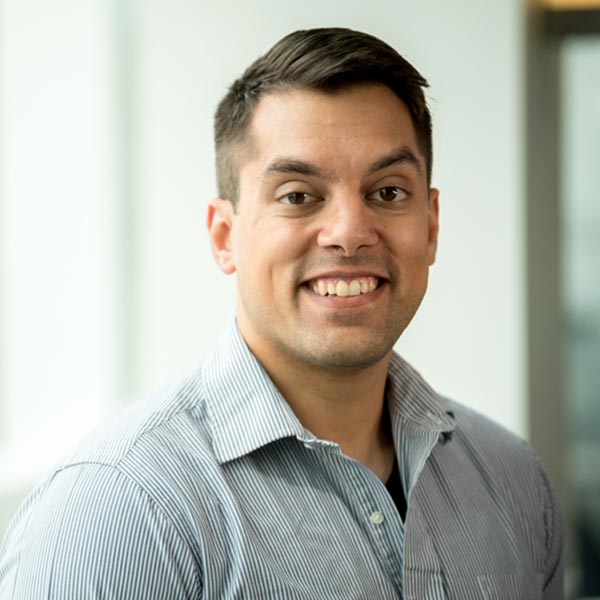
Now 33, the Best Teacher Award winner gives hands-on classes on computer systems, software engineering, computer graphics, and game engine programming.
“I really love teaching computer graphics, because students often stumble into it. Sometimes they arrive very interested and focused. Sometimes they’re just kind of curious — they liked playing a game, they saw a cool movie — but then they realize they get to apply all the math they learned in a useful context and see the results of their programming. It’s math and art combined,” Shah said. “Once my students understand that I’m not here to make their life difficult, I’m just trying to get them excited, then it changes the relationship a bit. It’s not adversarial, it’s ‘Let’s work together and see how much you can learn.’”
When he’s not teaching, Shah allocates time consulting on computer graphics and performance projects. His goal is to stay sharp for his students in an industry that’s evolving at lightning speed, and to work on cool projects — like 3D hologram technology — in the process. Challenging himself to learn and grow as a computer scientist also helps Shah empathize with his students.
READ: Khoury students win “Best of Looking Glass” Award at MIT hackathon
“I want my students not to be afraid if they don’t understand something the first time,” Shah said. “I usually have to hear something explained using two different analogies from two different people to make it concrete. You’re not abnormal if you don’t understand something right away — just keep working at it, you can do it.”
Subscribe to the Khoury College newsletter
The Khoury Network: Be in the know
Subscribe now to our monthly newsletter for the latest stories and achievements of our students and faculty